Chapter 10
Draw D-structure trees for:
- Does it seem that Donny is likely to be kissed?
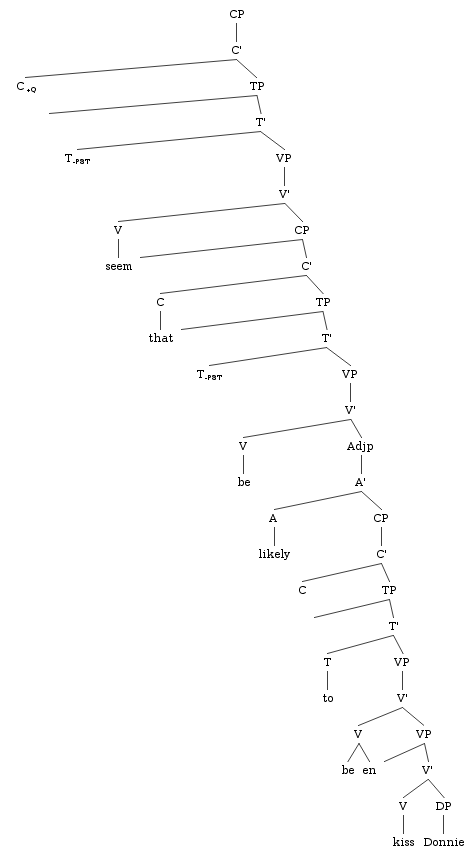
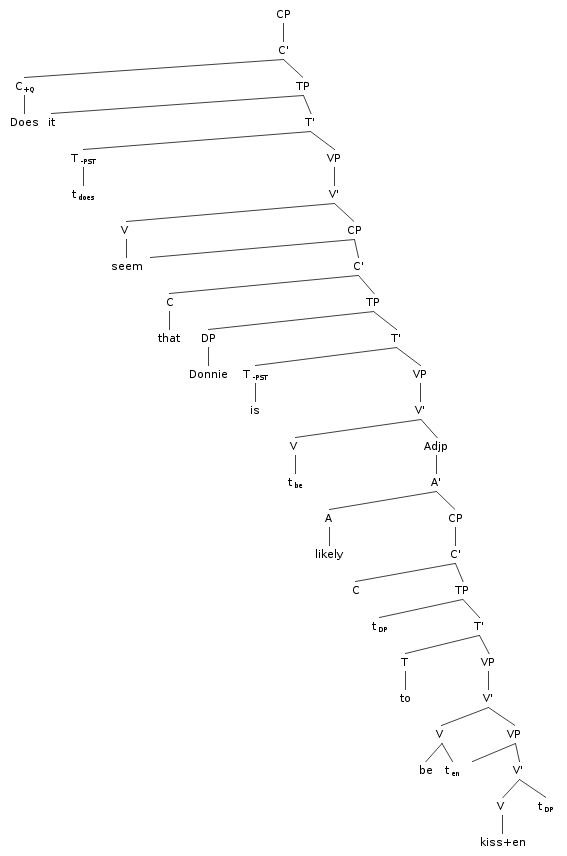
- Does it seem to be likely that Donny was kissed?
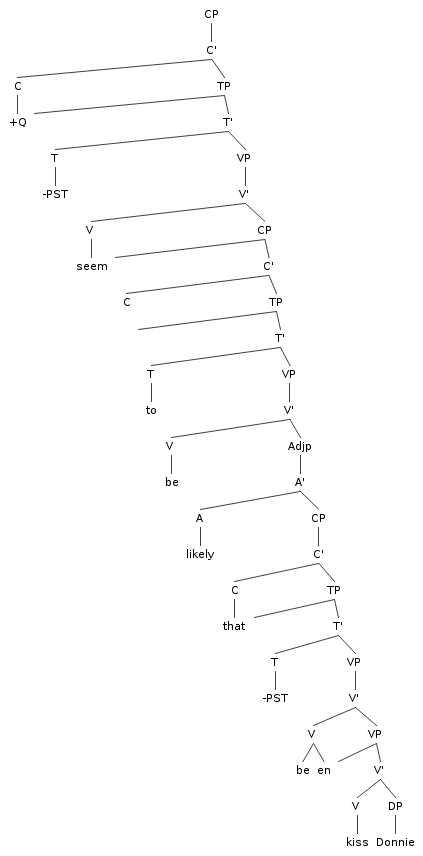
- Does Donny seem to be likely to be kissed?
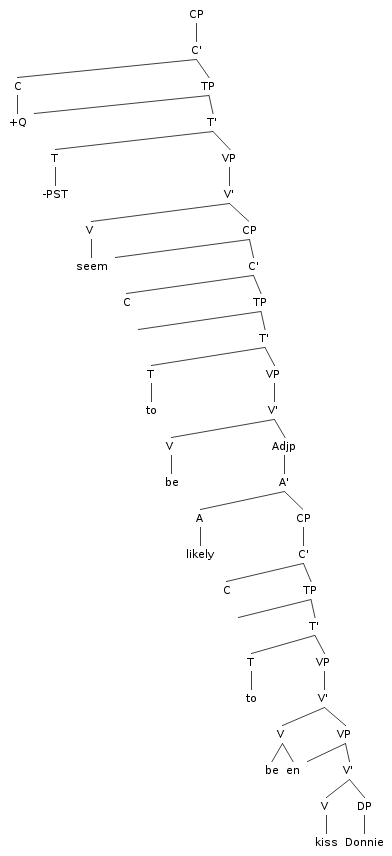
- Does that Donny was kissed seem to be likely?
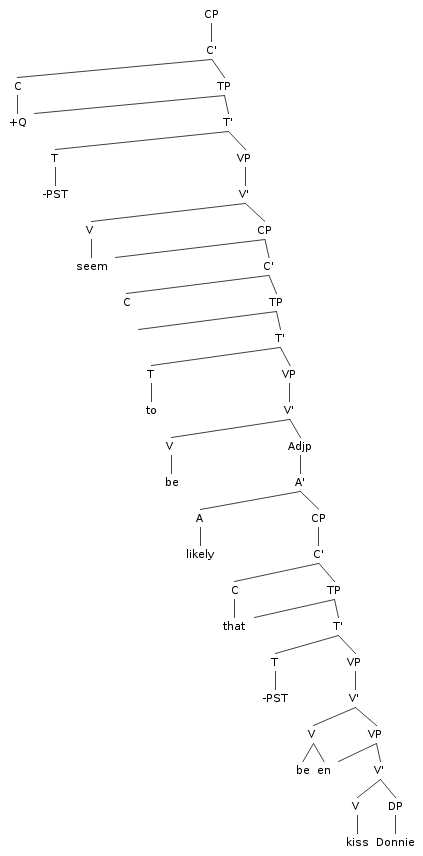
- Does it seem that that Donny was kissed is likely?
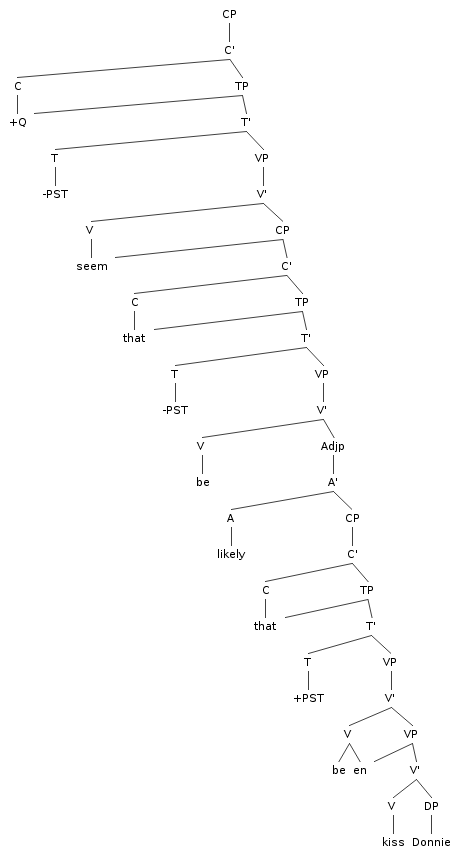
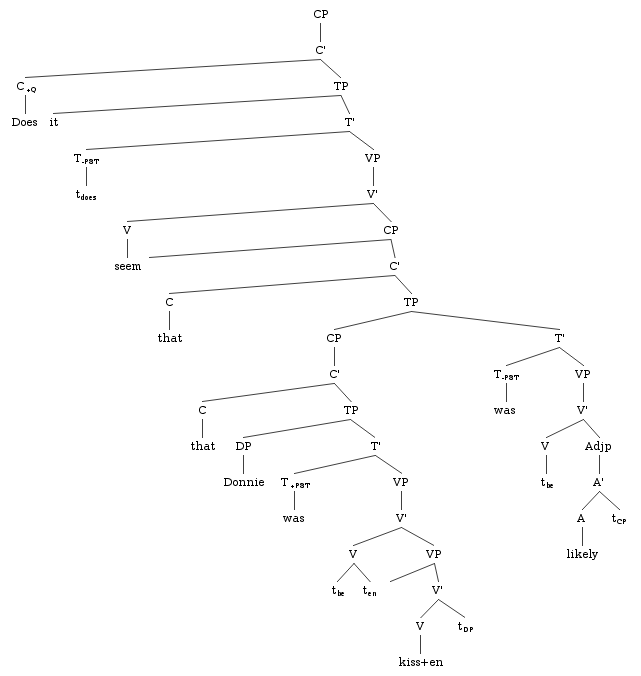
Is it the case that --- except for tense --- these sentences all have the same D-structure?
Grids
Draw the theta grids for:
- [CP Donnyi [T [+PAST] ] [V be + enj ] [VP kiss ti]] (one predicate: kiss)
kiss Agent
DPTheme
DPj i - [CP it seem [CP-k that Donnyi is likely [CP-l ti [T to ] [V be + enj ] [VP kiss ti]]l]k] (three predicates: seem, is likely, kiss)
| kiss |
|
seem |
|
likely |
|
sentences
What rules out the following ungrammatical sentences? Be specific. If it's the case filter, say what DP doesn't get case; if it's the theta-criterion, say what role of what predicate is left unfilled, or what argument of what predicate does not receive a role; if it's the EPP, say what clause lacks a subject; if it's the Minimal Link Condition, say what movement violates MLC and what target site has been skipped. If more than one principle is violated, identify them all.
- * Does it seem to be likely [CP Donnyi to have been kissed ti]?
-
Case filter violation: Donnie does not have case because
despite having undergone Passive movement, it is still
the subject of a non finite clause and cannot receive Nominative case.
- * Donnie was kissed Sue.
- Case filter violation: Sue cannot get case because en has robbed kiss of the ability to assign accusative case.
- Θ-Criterion violation: Donnie can't receive a Θ-role because en has absorbed the Agent-role of kiss.
- * Donniei seems [CP ti to be likely [CP that ti was kissed ti]]?
-
Unmotivated movement. Donnie has moved 3 times,
leaving 3 traces. The first movement
was motivated by the need to get case. But since [TP Donnie was kissed t] is tensed, the second movement was unmotivated. In fact
with the 3rd movement Donnie receives case twice, which
is never legitimate.
- * Donniei seems [CP that it is likely [CP ti to be kissed ti]]?
-
Either of two possibilities:
- A minimal link violation because Donnie has moved 2 clauses up without stopping, skipping an EPP site, Spec of the TP [ _ is likely [ ti to be kissed ti]]
- An unmotivated movement, because if Donnie lands in Spec of the TP [ _ is likely [ ti to be kissed ti]], further movement is unnecessary, since it can receive case there. Furthermore, after that unmotivated movement expletive-it has been inserted over a trace, which is an unmotivated expletive it insertion, since a trace already satisfies the EPP.
- * It seems [CP that Donniei is likely [CP it to be kissed ti]]? (assume the it is a dummy it.)
-
Either of two answers
- Donnie moves directly to Spec of the TP
[ _ is likely
[ ti to be kissed ti]]
- A minimal link violation: because Donnie has skipped Spec of the TP [ ti to be kissed ti] in moving.
- Case-filter violation: Expletive it-insertion then incurs a case-filter violation.
- Donnie moves first to Spec of TP
[ ti to be kissed ti]
and then to Spec of the TP
[ _ is likely [ ti to be kissed ti]]
- Unnecessary expletive-it insertion. Expletive it has been inserted over a trace.
- Case-filter violation: Expletive it insertion then incurs a case-filter violation.
- Donnie moves directly to Spec of the TP
[ _ is likely
[ ti to be kissed ti]]
Clauses
Do clauses need case? The following example provides an argument. Explain:
- It seems that John left is likely.
- * It seems that John left to be likely.
- That John left seems to be likely.
Why is the following example a problem for the theory that clauses need case (Note: Assume that adjectives can't assign case)
-
It seems to be likely that John left.
loophole
| Q: | Why can't there be
subject-to-object raising with one-argument propositional verbs
(the way there is with 2-argument believe)?
Hint: Think about Burzio's Generalization (Chapter 10). |